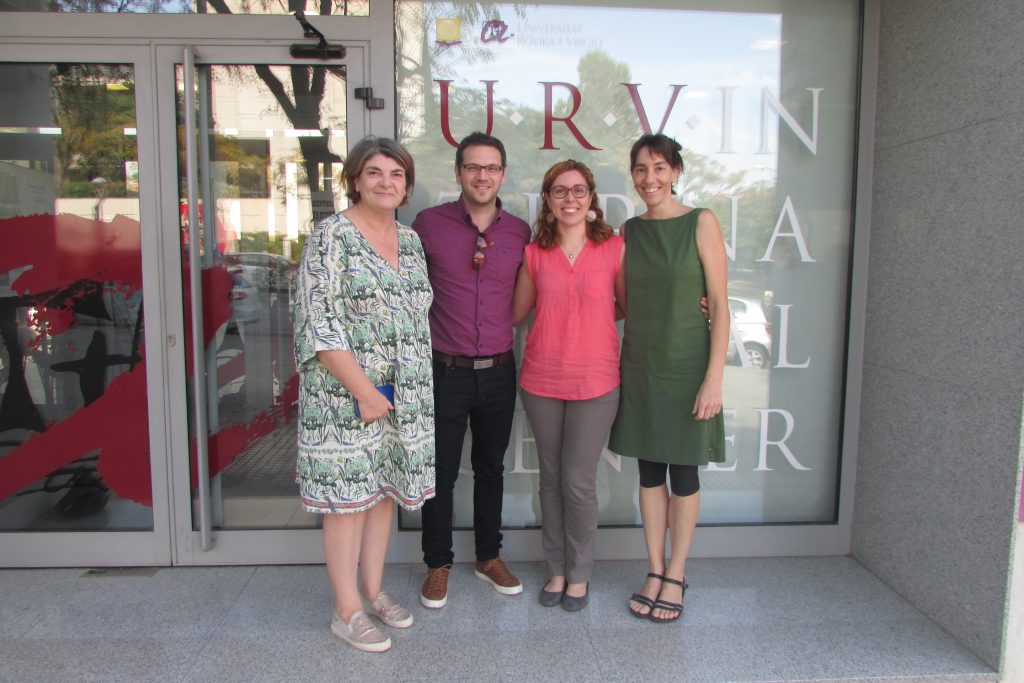25/11/2016
Alejandro Gariglio: “Travelling is synonymous with learning and teaching, and this is raison d’être of a university”
As part of the Staff Shadowing programme of the International Network of Universities (INU), last October we were visited by Alejandro Gariglio, the Design and Image Coordinator of the Directorate of Institutional Communication of the National University of the Litoral (Argentina) and lecturer on the degree in Design of Visual Communication

As part of the Staff Shadowing programme of the International Network of Universities (INU), last October we were visited by Alejandro Gariglio, the Design and Image Coordinator of the Directorate of Institutional Communication of the National University of the Litoral (Argentina) and lecturer on the degree in Design of Visual Communication
The aim of his visit was to acquire first-hand experience of how the Universitat Rovira i Virgili deals with communication and to analyse how designers interact with the various services and departments. During his stay he had several meetings with members of the University. He also took advantage of his time here to get to know the region.
- Why did you choose to participate in this mobility visit? Why did you choose this university?
I think there are two interesting aspects of mobility; on one hand, there is the exchange of specific working concepts and methodologies within the discipline or area in which you are studying and, on the other, there is the attraction of connecting with different cultures, languages, customs and ways of living. I believe that the latter is as enriching as the discipline itself. Of course, there is also the opportunity to interact and share with people.
Regarding my reasons for choosing the URV, it so happens that at the UNL we offer graphic design as a bachelor’s degree, and this means that the discipline has a strong presence in the institution’s management procedures. In fact, our Institutional Communications Directorate has a specific design section with a significant number of designers. This contrasts with the URV, where design forms part of other degrees as one subject among several others (in Publicity, for example), so I thought it would be interesting to look at this different approach to the discipline and at the same time analyse how the designers interact with the Communications Bureau.
- How was the experience? What have you learnt during your visit?
The experience was highly enriching in professional terms and, as I have mentioned earlier, I have learnt many other things that are not directly related to my profession. I have met people and experienced university life at the URV, I have eaten at the Campus, I have travelled by bus to get to different parts of the University, I have paced its corridors, and I have found everything to be really interesting because I have been able to understand from within the daily dynamics of another place of study.
- What opportunities did you have during the visit?
I am taking away with me much more than I thought. I was able to speak to all the people and areas that I wrote down in my original plan. I had the opportunity to understand the specific working methodologies of the Communications Bureau in order to compare it with what we do at the UNL. I am surprised by the technical quality and the specific equipment that they have here for producing audiovisual material. The design laboratory has equipment that most graphic designers can only dream about.
Of course, in parallel with this, I have also been able to enjoy the Mediterranean and the beautiful coastline, culture and Roman ruins of Tarragona.
- How do you think that your visit will benefit your department and the rest of the university?
I think that travelling opens the mind. Travelling is synonymous with learning and teaching, and this is raison d’être of a university. One benefits on a personal level (a priori), but the most interesting thing is being able to take that experience back to your workplace at your home university; that is, to take, on one hand, the specific content relating to your discipline, the working methodologies, and, on the other hand, to make colleagues aware of the importance of these types of cultural exchange.
- How did you find out about the mobility grants?
Well now I’m going to boast a little. At the UNL our Secretariat for International Relations works really well and, through close collaboration with the International Communications Directorate, they manage to get information about grant opportunities for students and, as in my case, administrative staff to all corners of the university. What I mean is that I was able to find out about these grants thanks to good coordination between the different parts of the UNL and with the International Network of Universities. It seems like all the cogs are well-oiled.
- Would you recommend this experience to your colleagues?
Without a doubt. In fact, during my time in Tarragona I have been in contact with colleagues at the UNL who have shown an interest in having a similar experience for themselves.
- Can you give us any interesting anecdotes from your mobility visit?
Well, finding that the design laboratory had a 30 i-Macs certainly made a big impression. Something else that has stuck with me is the three-metre high Roman wall in the restaurant where we had our welcome reception (absolutely marvellous).
And I mustn’t forget to mention that I played Frisbee on the beach with URV merchandising. To be honest, I have had a great time.
More news about: Alejandro Gariglio, Argentina, International Network of Universities, INU, mobility, National University of the Litoral
